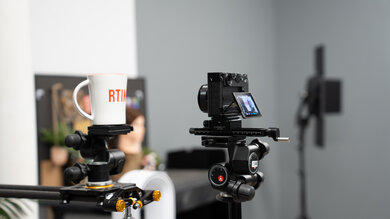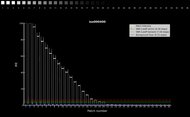Compact cameras (also known as point-and-shoots) are a logical choice if you want a dedicated camera for everyday travel or street photos without the bulk or complexity of an interchangeable lens model. These cameras are typically small and lightweight, often pocketable, and feature built-in lenses, so you can focus more on pointing and shooting. While smartphone cameras are getting more and more impressive, many compact cameras still offer a level of image quality and features that you can't really get with a smartphone, like long zoom lenses and optical image stabilization.
Most of our picks here are higher-end point-and-shoots. That's largely because, unless you buy an older used model, cheaper new options are dwindling and typically aren't worth the investment over simply using the smartphone you most likely already own. But if you're an enthusiast who wants a compact camera to shoot with on the side, or you like the idea of a dedicated all-in-one camera, there are still some great options to choose from.
We've bought and tested over 110 cameras, and below, you'll find the best compact cameras to buy in 2025. If you want something relatively portable with an interchangeable lens, try the best mirrorless cameras for travel or the best mirrorless cameras more broadly, which tend to be smaller and lighter than traditional DSLR options. Alternatively, if you're looking for a portable camera to vlog with, you can check out our best cameras for vlogging.

We've independently bought over 100 cameras and tested all of them with a standardized methodology. All the results are available to allow you to make the right purchasing decision for your need, with objective and data-driven reviews. We keep every product in our lab inventory to ensure we can go back, retest models, and verify that all the information we provide is still accurate.
-
Best Compact Camera
 Travel Photography7.8Landscape Photography7.8Sport & Wildlife Photography7.7Vlogging6.4Studio Video7.9Action Video6.0Raw Photo7.9Body Type:Large Sensor CompactMirrorless:YesSee all our test resultsSensor Size:APS-C
Travel Photography7.8Landscape Photography7.8Sport & Wildlife Photography7.7Vlogging6.4Studio Video7.9Action Video6.0Raw Photo7.9Body Type:Large Sensor CompactMirrorless:YesSee all our test resultsSensor Size:APS-CThe long-awaited Fujifilm X100VI is the best fixed-lens compact camera we've tested. It isn't the most portable option, but it makes up for that by being one of the most full-featured point-and-shoots on the market. With a high-resolution APS-C sensor and a bright 35mm-equivalent f/2 lens, this premium model captures excellent image quality with plenty of detail and dynamic range. It's also one of the few compact cameras that feature in-body image stabilization (IBIS) to get steadier handheld shots. Another standout feature is its hybrid viewfinder, which lets you toggle between an optical rangefinder and an electronic viewfinder.
That said, the X100VI doesn't come cheap, and even if it's within your budget, it's so in demand that stock is hard to come by. If you don't want to wait on a back-ordered product or you're simply looking for something cheaper, read on to learn more about some of the other best compact digital cameras that we've tested.
-
Best Pocketable Alternative
 Travel Photography7.3Landscape Photography8.4Sport & Wildlife Photography6.0Vlogging3.9Studio Video3.5Action Video3.8Raw Photo8.8Body Type:Large Sensor CompactMirrorless:YesSee all our test resultsSensor Size:APS-C
Travel Photography7.3Landscape Photography8.4Sport & Wildlife Photography6.0Vlogging3.9Studio Video3.5Action Video3.8Raw Photo8.8Body Type:Large Sensor CompactMirrorless:YesSee all our test resultsSensor Size:APS-CThe RICOH GR III is the most pocketable camera on this list and the only option on our list aside from the Fujifilm X100VI that features a larger APS-C sensor. That larger sensor provides excellent image quality, more dynamic range, and generally better noise handling in low light than most compact cameras, although it's a lower-resolution sensor than the one on the Fujifilm. The GR III also has a much more minimalist design, which makes it less stylish but better suited for discreet street photos. In general, the camera doesn't have many frills—no viewfinder or 4k video capability and a fixed screen that limits your shooting angles.
Whereas the X100VI has a 35mm equivalent focal length, the RICOH's built-in lens has a slightly wider 28mm equivalent focal length and an f/2.8 aperture, giving you a tad less leeway in low light. If you prefer a tighter field of view, opt for the RICOH GR IIIx—while it's a little pricier, its lens has a 40mm equivalent focal length that offers a more "standard" field of view. There are also HDF variants of both models, which trade the built-in ND filter for a 'Highlight Diffusion Filter' that creates soft, dreamy highlights. Ultimately, if you want images of the same caliber as the Fuji X100VI but prefer a more minimalist camera that'll actually fit into your pocket, you can't go wrong with the GR III or the GR IIIx.
-
Best Compact Zoom Camera
 Travel Photography7.3Landscape Photography6.9Sport & Wildlife Photography7.2Vlogging7.2Studio Video6.5Action Video5.2Raw Photo6.3Body Type:Point and ShootMirrorless:YesSee all our test resultsSensor Size:1-inch
Travel Photography7.3Landscape Photography6.9Sport & Wildlife Photography7.2Vlogging7.2Studio Video6.5Action Video5.2Raw Photo6.3Body Type:Point and ShootMirrorless:YesSee all our test resultsSensor Size:1-inchIf you're looking for something with some zoom range, the Sony RX100 VII is the best compact digital camera we've tested with a zoom lens. The tried-and-true formula of the RX100 series consists of a highly portable design, a relatively wide zoom range, and more extra features than you can shake a stick at. Unlike your average compact camera, the RX100 VII uses a larger 1-inch type sensor, so image quality is great for its class, though not quite as impressive as the cameras mentioned above. The sensor's stacked design also allows for quick 20 fps burst shooting while reducing rolling shutter distortion.
Although the RX100 VII doesn't have the longest zoom range, its 24-200mm full-frame equivalent lens has enough range to give you some flexibility with framing. The camera's also packed with thoughtful design touches, like a small pop-up viewfinder and a pop-up flash—all while easily fitting into a coat pocket or small bag. That portability does come at the cost of a short battery life, but most compact cameras struggle in that arena, so it comes with the territory. If you want to save some money, you can still find older models in the RX100 series on the used market for less.
-
Best Compact Vlogging Camera
 Travel Photography7.4Landscape Photography7.2Sport & Wildlife Photography7.3Vlogging7.9Studio Video7.0Action Video5.2Raw Photo6.5Body Type:Point and ShootMirrorless:YesSee all our test resultsSensor Size:1-inch
Travel Photography7.4Landscape Photography7.2Sport & Wildlife Photography7.3Vlogging7.9Studio Video7.0Action Video5.2Raw Photo6.5Body Type:Point and ShootMirrorless:YesSee all our test resultsSensor Size:1-inchCompact cameras can be a good fit for vlogging thanks to their ease of use and portability, and the Sony ZV-1 is among the best we've tested for vloggers. In fact, it's the only option here with a fully articulated screen fit for self-recording. It even has a specialized 'Product Showcase' mode for product and beauty vloggers, prioritizing focus on any objects held up in the frame. Its 1-inch sensor captures good video quality, too, with excellent autofocus and a fair selection of frame rates, including a high-speed recording mode in 1080p.
It's worth mentioning that the Sony ZV-1 II has since replaced the original ZV-1. The ZV-1 II uses a wider-angle lens with a wider field of view (FOV) that, on its face, is better suited to handheld vlogging. However, the new model no longer features optical stabilization, and its digital stabilization feature crops in some of that wider FOV. For that reason, the original ZV-1 is still our top pick, especially since it costs less.
-
Best Budget Compact Camera
 Travel Photography5.9Landscape Photography3.0Sport & Wildlife Photography6.0Vlogging6.3Studio Video4.9Action Video3.7Raw Photo0.0Body Type:Point and ShootMirrorless:YesSee all our test resultsSensor Size:1/2.3-inch
Travel Photography5.9Landscape Photography3.0Sport & Wildlife Photography6.0Vlogging6.3Studio Video4.9Action Video3.7Raw Photo0.0Body Type:Point and ShootMirrorless:YesSee all our test resultsSensor Size:1/2.3-inchOnce you dip into budget territory, worthwhile options are fewer and farther between, but the Canon PowerShot SX740 is a solid choice that won't cost you too much. Of course, if you really want to save money, the best option is to simply stick with your smartphone camera, which is already waiting for you in your back pocket. But if you're craving the feel of a camera in your hands or you need the zoom range that a point-and-shoot can provide, the SX740 is a good choice at a relatively low price point.
Though it has a smaller sensor than our previous picks, its built-in lens can extend to a max full-frame equivalent focal length of 960mm, giving you an incredibly wide zoom range to shoot everything from landscape shots to close-ups of faraway subjects. Its image quality is nothing to write home about, but it's more than suitable for casual or family photography, and the camera's tilt-up screen makes it easy to take selfies or shoot at waist level. Ultimately, this point-and-shoot will serve you well if you need something very compact with a ton of zoom at a reasonable price.
Notable Mentions
- Canon PowerShot G5 X Mark II: The Canon PowerShot G5 X Mark II is a premium compact zoom camera from Canon. It has a shorter max zoom range than the Sony RX100 VII but a slightly wider max aperture, giving you a tad more leeway in low light. However, it's been discontinued and is harder to find. See our review
- Canon PowerShot G7 X Mark III: The Canon PowerShot G7 X Mark III is a popular compact camera for vloggers and content creators. It has a longer zoom range than the Sony ZV-1 and includes a built-in livestreaming feature, but it's more expensive, doesn't have a fully articulated screen, and has a less reliable autofocus system. See our review
- Panasonic LUMIX LX100 II: The Panasonic LUMIX LX100 II is a compact camera with a Micro Four Thirds sensor and an effective 17-megapixel resolution. Enthusiasts will appreciate its dedicated exposure controls and retro-inspired design. However, it isn't as versatile as the Sony RX100 VII, with a less reliable autofocus system and shorter zoom range. See our review
- Panasonic LUMIX ZS80: The Panasonic LUMIX ZS80 is a great budget compact camera. It's cheaper than the Canon PowerShot SX740 and even has a viewfinder, but it's been discontinued and is harder to find in stock. See our review
Recent Updates
Jan 15, 2025:
We've checked that the article is still accurate and up to date.
Oct 17, 2024:
We reviewed the picks in the article to make sure they're still accurate and relevant for users.
Sep 17, 2024: We moved the Canon PowerShot G7 X Mark III to the Notable Mentions because it's back-ordered and harder to find in stock. We also added the Canon PowerShot G5 X Mark II to the Notable Mentions because, despite being discontinued, it's a well-rounded compact option.
Aug 22, 2024: We touched up some of the text in this article for better clarity and to ensure everything is current.
Jul 26, 2024: We added the Fujifilm X100VI as the best overall pick, then renamed the RICOH GR III to 'Pocketable Alternative' and the Sony RX100 VII as the 'Best Compact Zoom Camera.'
All Reviews
Our recommendations above are what we think are currently the best compact fixed-lens cameras for most people to buy, according to their needs. We factor in the price, feedback from our visitors, and availability (no cameras that are difficult to find or almost out of stock in the U.S.).
If you would like to choose for yourself, here's the list of all our reviews for compact and ultra-compact cameras. Be careful not to get caught up in the details. There is no single perfect camera. Personal taste, preference, and shooting habits will matter more in your selection.

























